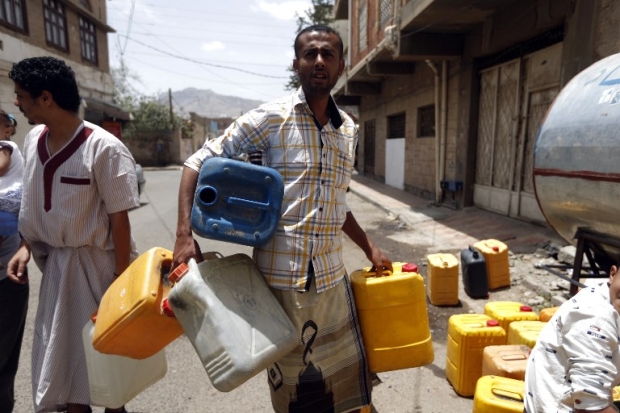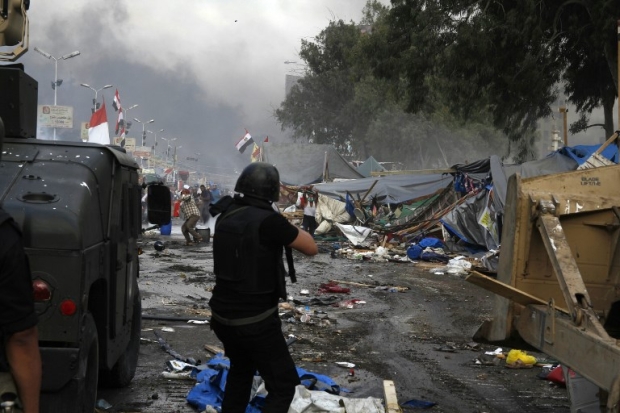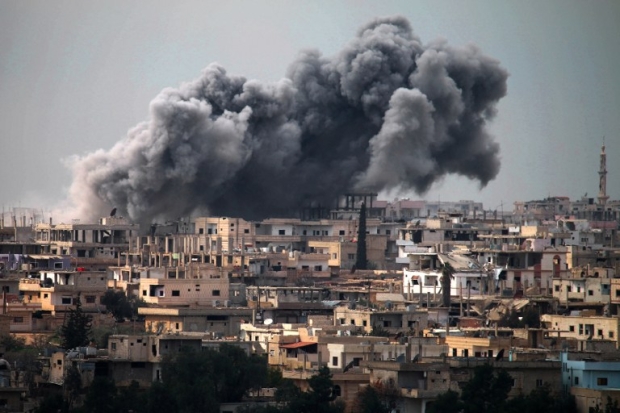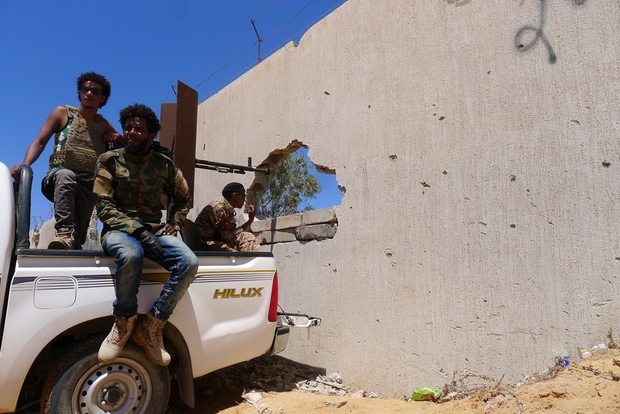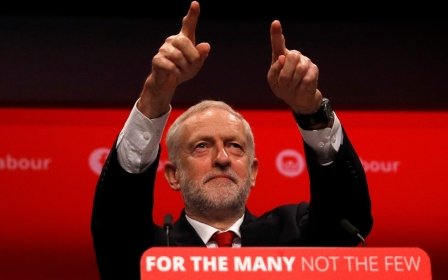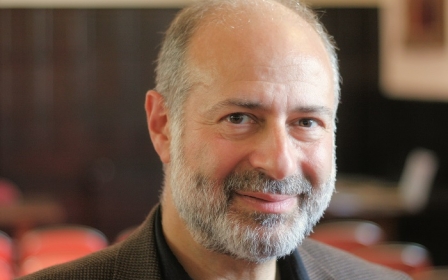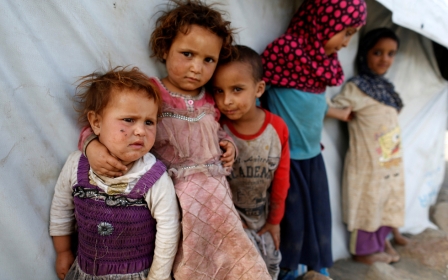INTERVIEW: Shadow Foreign Secretary Emily Thornberry says UK has lost 'moral anchor'
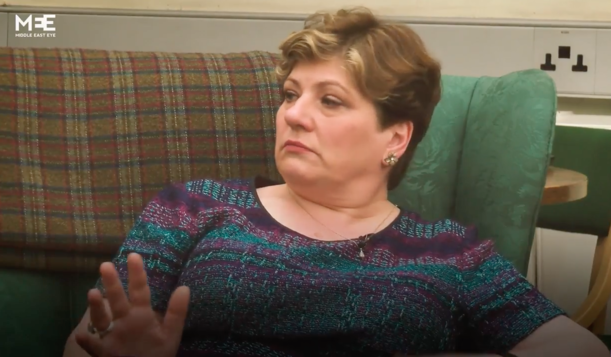
MEE: This week marks the 100th anniversary of the Balfour Declaration. Theresa May refused to apologise to Palestinians for Britain’s responsibility for what befell them as a result of that declaration. The declaration itself carried an important proviso that nothing should be done to prejudice the civil and religious right of existing non-Jewish communities in Palestine. If you were foreign secretary now, would you invite an Israeli prime minister to Britain to celebrate Balfour?
ET: I don’t think we celebrate the Balfour Declaration but I think we have to mark it because I think it was a turning point in the history of that area and I think probably the most important way of marking it is to recognise Palestine.
The British government have said they will do, it’s just a question of when the time is right and it seems to me this is the time.
I remember when [Palestinian President Mahmoud] Abbas came to Britain it was a few years ago and I was at a meeting with him and I said:” What would be the one thing you would want from us?” And he said;” recognition”.
And I remembered that. It’s two states. We need to have two states, two viable states, two viable secure safe states. We must not forget that in the end that is the only solution. We should measure everything we do against that.
MEE: Are you going to the dinner for Balfour? Do you feel uneasy about attending, given that there are no invitations to Palestinians?
ET: I am going to a Balfour meeting with Palestinians as well.
MEE: Do you think this whole centenary has been properly handled? Has it been properly balanced?
ET: It’s always difficult to be properly balanced. I try my best.
MEE: Would not you also expect a British government to make some proper complaints about Israeli policy on the West Bank. Today there is a story in Haaretz about an Israeli bill that would annex settlements in the West Bank to Jerusalem. Wouldn’t you expect a British prime minister to be very concerned indeed?
ET: Of course the undermining of the possibility of a two-state solution has to be said, and said clearly, it’s undermined in terms of security on both sides, it’s undermined in terms of settlements.
This is not the way forward. As somebody who has been a member of Friends of Israel since I joined the Parliamentary Labour Party, and I am a member of Friends of Palestine, it seems to me to be entirely consistent with a British politician in favour of a two-state solution you need to be friends with both sides. But friends need to speak the truth.
And I feel that sometimes the Israeli government has lost its way. What are they now doing? Are they heading for a one state? It seems on the face of it that they may be.
And in that way they are letting down the Israeli people because you cannot have a democratic, Jewish one state in that area. So they will have to choose.
And they are just going against the vision of [first prime minister of Israel David] Ben Gurion to have a democratic Jewish state and you need to have alongside it a secure viable Palestinian state.
And people seem to have forgotten this. Over the 20 or 30 years since I have been going to the area, one thing that strikes me is the separation of the peoples, the building of settlements.
But you know there was a time when Tel Aviv housewives would meet Palestinians, even if it was a Palestinian gardener, there was some kind of communication. But now it’s so difficult to get across the border.
I remember in 1982 driving all over the West Bank, backwards and forwards, there was no problem. The last time I went, it was almost impossible to get from Jerusalem to Bethlehem, because of the security situation. It is not just the settlements, it’s also the road closures, the security points, the flying posts which just makes a Palestinian state unviable.
MEE: What would you do as a government to express that formally to a government of Israel? What about arms sales, or buying products that came from settlements in the West Bank?
ET: I think it is important that the Israelis know that we are friends and that we fully understand the security of the Israeli people is important. What is a government first about? It’s about offering security to their citizens and that has to be a priority for them and you have to understand and recognise that.
MEE: Even though Israel expresses its security in terms of what it denies Palestinians?
ET: Yes, I know. It has to be consistent with basic principles which are that you don’t sell arms for internal repression. As for buying products, we need to buy products from Israel, but Labour policy is a clear one which is that settlement goods should be clearly labelled so that people should make their own choice. Products are not clearly labelled. Its EU policy but it’s not clearly enforced.
MEE: But you would not go as far as a boycott?
ET: It’s the boycott point. It would be up to individuals as to whether they bought them or not. It’s against our law for British firms to be investing in the West Bank and that has to be made clear. In Alexandra Palace (in North London) there were estate agents who were selling holiday flats on the West Bank. That should not have happened. That should have been stopped.
MEE: Tony Blair has recently said he regretted the boycott of Hamas and the siege of Gaza. What is your reaction to that?
ET: Let’s see what happens to the rapprochement between Fatah and Hamas. I know there has been a number of times in the past when it has been hoped that Fatah and Hamas will work together and then it comes to nothing.
The people of Gaza need to be represented properly and they cannot simply be sealed in and ignored in the way that they are. And the future of the West Bank has to include Gaza and Gaza properly represented.
MEE: And how rigorous would you have been about Shai Masot (the Israeli embassy official) and his attempts to set up a youth wing for Labour Friends of Israel? When this was revealed, you said this amounted to an issue of national security. Masot has returned to Israel but there was no inquiry. Would you call for one now?
ET: We have to put it in context of what seemed to be happening. Al Jazeera had uncovered evidence that the Israeli government were acting through the Israeli Embassy closely with Labour Friends of Israel to undermine one of the government ministers.
And that is unacceptable and that needed to be called out. It was unacceptable and it should not have been me that was saying that, it should have been the British government saying that.
MEE: Should there now be an inquiry about it? Alan Duncan and Crispin Blunt were both targeted. This was a cross-party issue.
ET: Where we have got to is that a complaint was taken out against the broadcast. Ofcom has said that the broadcast stands. So I know that the Labour Party is looking at it and looking at what our appropriate response is and I cannot say any more about that.
MEE: There is a continuing Labour Party action?
ET: We noted the fact that Ofcom did not uphold the complaint and from conversations that I have had, this is not being laid to rest now. We have not decided what we are going to do next, but this is not something that we are going to drop.
MEE: It was not just the plotting against Conservative ministers, it was also the very clear collaboration between the Israeli Embassy and Labour Friends of Israel.
ET: It’s difficult because there is quite of a lot of Labour friends of this and Labour friends of that, where they do work quite closely with embassies and that is the truth. I don’t want to name any others, but the reality is that these groups do work closely together. I do not have a problem necessarily with that but I think the attempt to undermine government ministers was a different issue and it is serious.
MEE: So you were relaxed about Labour Friends of Israel pursuing a pretty clear agenda at Labour conference in what looked to be a very non-public way? £1m was offered at one stage for trips.
ET: It’s for trips. Lots of parliamentarians go to both Israel and Palestine paid for by a number of different groups. Our policy in the Foreign Office team is that we pay for them ourselves.
Saudi Arabia
MEE: The Defence Secretary Michael Fallon told the defence committee that criticism of Saudi Arabia in Parliament is not helpful when Britain was trying to secure an order for a new batch of fighters.
What would you do in government, faced with the very real consequences of not securing an arms contract with Saudi in terms of jobs lost in Lancaster, the jobs of Unite members? How would you deal with the imperative to look the other way with Saudi because thousands of British jobs are at stake?
ET: The quote you read out was a fairly unsubtle attack on me because the biggest critic of Britain selling arms to Saudi Arabia is probably me. And obviously I think I am right.
I think we should not be selling arms to Saudi Arabia in current circumstances. It used to be that the government used to make a nod towards human rights and international law, but it seems to me that they have shed that veil completely.
It’s as if we do not have any restrictions on our arms any more. International law and British law is that you don’t sell arms to another country that will use them for internal repression or for the slaughter of civilians.
And it seems to me that there is perfectly clear prime facie that our arms are being used in Yemen to kill civilians. And therefore I don’t think we should be selling arms to Saudi Arabia in current circumstances. We should not be selling arms until there is a proper international independent investigation into what has happened, looking at both sides, but on the face of it the Saudis are bombing agricultural lands, schools, weddings, funerals…
MEE: Hospitals…
ET: Hospitals. You have cholera stalking the country. You have the worst international crisis in the history of the United Nations and it’s a forgotten war and we have a hand in this. I don’t think that we should. I am not saying we should not sell arms across the world, but we should not sell arms in my view in contravention of those two principles.
If there is something wrong with our law, we will tighten it up and make sure we don’t sell arms to governments that are using them in warfare where civilians are being killed in this way, where they don’t seem to be targeting in a way which is in furtherance of war, but is in furtherance of cholera, famine, and of slaughter of innocent people in Yemen. It’s wrong.
MEE: And the consequences in Lancashire?
ET: Let me just make this clear. If Fallon does not like me doing this then, tough. Because it’s not my job to be supportive of the government. It’s my job to hold them to account. And I will hold them to account on this. And I will be critical.
Now there are a number of countries where we sell arms to and it seems to me that our arms industry has always been lateral thinking and has been very creative.
They need to know that if a Labour government is elected and if the Tories have not by that stage stopped selling arms to Saudi to use in Yemen, or the Saudis have not changed their policy, we will stop selling arms to Saudi Arabia. They are on notice.
There needs to be an international independent inquiry under the auspices of the United Nations to what has happened in Yemen and the outrages on both sides.
MEE: Do you think ministers have been straightforward with the British people about what’s gone on in Yemen? Are British ministers guilty of war crimes? You say that international law is being breached and we are still supporting the Saudis, protecting them diplomatically, plying them with arms. You are a lawyer. Is there a chance they could be held accountable for this?
ET: I am not actively a lawyer now but I know enough of international law to know that there are as many versions of international law as the number of international lawyers you can get into a room.
The important thing in terms of the future of Yemen, and that is really what we should be most worried about, is to stop the arms sales to Saudi. You cannot produce munitions fast enough to sell to Saudi. We have to stop it.
Gulf crisis
MEE: The Gulf crisis affects Britain, because a post-Brexit Britain would be looking for a free trade deal with the GCC. Now you have Gulf neighbours laying blockades, punching it out in the media and think tanks in London and Washington. What’s your view of what’s going on?
ET: If you have a foreign policy which does not have any anchor other than to sell as many trade contracts as possible and if that is really what the bottom line is, when you lose your way then you do end up in the most peculiar knots.
MEE: So you think British foreign policy has lost its moral anchor?
ET: Yes I do. Post-Brexit we are scrabbling around the world trying to find trade deals and we seem to have lost our moral anchor. It does not have to be like that.
Of course you have to be pragmatic and I am not saying we are going to be starry eyed, but there needs to be more in your relations with foreign countries than the need for trade deals.
We need to pay attention to the human rights record and international law as part of selling products to countries and relationship with those countries has to be multi-layered.
It cannot just be the need to sell. You end up in the peculiar position where Qatar invests hugely in London. The sovereign wealth funds are very important to the British economy, so in the end Britain does not get involved at all, because they do not want to upset anyone.
Because we are dependent on everybody in the area. We don’t have anything to say about the cold war between Saudi and Iran. Because we dare not really get into it. So we back off.
This is Britain, and we have historically had a very important role in this area and indeed we have a Foreign Office that is a brains trust. Some of the brightest and the best in Britain go to work in the Foreign Office and could be of great assistance because of the knowledge and the sophistication.
'Sometimes I think that Boris is looking so hard at how he is going to be the next prime minister, he overlooks the day job'
MEE: Do we really have a foreign secretary?
ET: Well. It used to be that if you wanted to be the leader of the party you would work at the very best at the job you were doing. Sometimes I think that Boris [Johnson, UK Foreign Secretary] is looking so hard at how he is going to be the next prime minister, he overlooks the day job.
There is not the understanding and the analysis of detail that I think there should be.
US President Donald Trump
MEE: How as foreign secretary would your government deal with US President Donald Trump?
ET: I have been pretty clear about our attitude to Trump. I do not think Trump represents the values of the America I recognise and I think we should be perfectly clear about not agreeing with him.
I think the Foreign Office have been a bit complacent about this. I think they thought that everything would be okay on the Paris climate change agreement.
Boris even told me in the House that I was being unnecessarily pessimistic about it. And I was not, I was right. And he said I was being unnecessarily pessimistic about the Iran deal and that Trump would come round. Well he has not.
And I think they should have realised that this was going to happen and started to do more work than they did. I have met many Americans who do not agree with Trump and indeed many in the American administration who do not agree with Trump and you need to work around him on both sides of the aisle, and make sure we make friends, because that is the way we influence.
The way in which the American constitution seems to be kicking in and seems to be containing him, not enough, there are still people walking behind him with the nuclear button, but there is a containment of Trump going on at the moment and that is something we should encourage and we should be learning ways of getting around him.
But we should not be kowtowing to him, holding his hand.
MEE: Should he have been invited on a state visit?
ET: Well he cannot be disinvited. So he’s coming. That’s how it is. There is not an American president who has been invited quite so quickly ever. To be invited within three months of being elected, that’s unprecedented. Obama has to wait a couple of years. Clinton had to wait a few years.
Normally you would give a president a little time to settle in before inviting him to meet the Queen. But it’s happened, and I don’t want her to be used as a political football now. We would have approached it in a different way.
'I think [Trump] is temperamentally unfit for office. I do not think he has the calm and the strength to be leader of the free world'
MEE: Do you think Trump will last one term of office?
ET: Like so much of politics at the moment, it’s so difficult to predict what is going to happen next. Clearly there are attempts to impeach him, I don’t know whether he would want to continue in office. He is so fundamentally unpredictable.
MEE: Do you think he is unfit for office?
ET: I think he is temperamentally unfit for office. I do not think he has the calm and the strength to be leader of the free world.
Egypt
MEE: Irrespective of his record in office, Mohammed Morsi is Egypt’s first democratically elected president and he is languishing in prison along with over 40,000 other political prisoners. Egypt appears to be under absolutely no pressure about any of this. Don’t you as a democratically elected politician feel some responsibility to him?
ET: I hear what you are saying. I have been focusing more on the potential changes in the law, introducing 15 year sentences for being homosexual in Egypt.
When I have been thinking about Egypt I have been concerned about those sort of changes and the way [Egyptian President Abdel Fattah al-] Sisi is tightening his grip on Egypt and the way that Egypt is changing and not necessarily for the better.
The way in which the British government seem to be intensely relaxed about Sisi and where he is taking the country - it brings you back to my central theme that foreign policy should be about more than contracts.
MEE: It seems to be beyond the ability of British ministers to describe events which led to the removal of the democratically elected president as a coup d’etat. Would you call what happened a military coup?
ET: I don’t know enough about it. The difficulty is that we had so many different voices around about it, a people who were alarmed about the Muslim Brotherhood and where Egypt was going, and people in demonstrations against the MB. There is such a cacophony of noise, that it’s quite difficult to cut through it.
All I can say now is that I am concerned about where Sisi is taking the country. It’s becoming increasingly repressive, it’s becoming much less socially liberal, there are large numbers of political prisoners, the closing down of newspapers, the arrest of journalists, all of these matters are breaches of human rights and have got be matters of grave concern.
'I am concerned about where Sisi is taking the country. It’s becoming increasingly repressive, it’s becoming much less socially liberal, there are large numbers of political prisoners'
MEE: Britain is Egypt’s largest foreign direct investor. What as foreign scretary would you do about that?
ET: We cannot look at our relationship with other countries just in terms of the bottom line. We have to be also talking in terms of human rights abuse and breaches of international law.
MEE: So you would use contracts as levers?
ET: The things have to be connected.
MEE: You are not prepared to call what happened a military coup, however there was a massacre on the streets of Cairo which according to Human Rights Watch was the worst massacre of unarmed civilians since Tiananmen Square. There have been attempts to secure justice for it. As a lawyer you know that British courts operate under a concept called universal jurisdiction. And yet when Egyptians who have command and control responsibility for that massacre arrive in Britain, they are given special mission immunity from the Foreign Office. There is a war crimes unit of the Special Branch that has the papers on this.
ET: There used to be a right for individuals to arrest for war crimes and that right was given to the state to prosecute and we assured them that the state would use their powers and that they would then be the ones responsible for prosecuting.
We have a duty to prosecute for war crimes as a general duty. You have to be able to weigh up other factors. If there are talks about the future of the country, you cannot not invite people because they are worried they are going to get nicked. There has to be some form of flexibility in relation to that.
MEE: Are you happy about the Foreign Office giving special protection to Egyptians who were responsible for this massacre?
ET: I would want to know why. We have an overriding duty, which is to prosecute for war crimes.
MEE: Under a Labour Government would this policy would change?
ET: We would be pushing human rights in the centre of our foreign policy and that would mean that examples like this would not just be swept under the carpet. We would need to see why these decisions were made in the past and whether we ought to be making these decisions in the future.
We can guarantee that that process will be gone through and looked at in a rigorous way. People can be confident that a government led by [Labour Party leader] Jeremy Corbyn would take this very seriously. As a politician I would say I am not going to let you make this decision because it’s easier, or because we are chasing contracts.
Britain
MEE: What does a post-Brexit Britain look like in terms of foreign policy? Is it a Singapore without the noodles?
ET: Despite our history with the Commonwealth, the truth is that British foreign policy has been trying to chart a course between the European Union and America. And we are leaving the European Union and the Americans have got this president we don’t agree with. Where is British foreign policy in the middle of all of that?
That’s why we have to go back to certain guiding principles, multilateralism, keeping to the law, human rights, remembering we have a place on the Security Council, remembering our history in the world.
Against the cacophony of voices on the international stage, we could hone our own voice, one of principle and truthfulness. We could have a much greater influence than we do and I think the world is missing us.
MEE: Do you agree with Rory Stewart, the International relations minister, that we should just kill members of the Islamic State group?
ET: If someone in any circumstances is attacking another human being, a civilian, then you have to defend that civilian and it does mean they should be killed whether that’s on London Bridge or anywhere else, if you are defending someone, then of course.
'These people should be brought to court and they should be charged and tried. The rule of law is an important principle'
MEE: I think he is saying is that if they are captured they should be killed. Do you agree with that?
ET: That is a message that I would not be giving out. What’s he saying? He is saying that if British people are found in Syria or Iraq and another group captures them, that the British government is saying they should be killed.
These people should be brought to court and they should be charged and tried. The rule of law is an important principle and I was surprised to hear him say that.
Syria
MEE: Have you been supportive enough of the Syrian opposition?
ET: Which Syrian opposition?
MEE: The people who rose up against a very oppressive regime. They may have been swamped by other elements, but have you supported them sufficiently or are you too pro a regime which is responsible for massive human rights abuses in its prisons, using Sarin gas, using barrels bombs.
ET: I think the Syrian civil war is multi-layered and multi-faceted. There are not goodies and baddies. There might be White Helmets, but there are not people wearing white hats and black hats. This is not a cowboy shoot out.
It is an immensely complicated situation and there are countries all over the region who are fighting [Syrian President Bashar] Assad as a proxy war with the people they support. And I don’t think that the British are necessarily going to be of any assistance producing more weapons in those circumstances.
In the end, it’s boring, it’s not very glamorous, it takes a long time, but these things have to be talked through. I would have preferred the British playing a role of being able to help facilitate that and not being a player in that. I don’t think action should be taken in a unilateral way.
We should do it multilaterally through the auspices of the United Nations. It’s about time we learned some lessons from the recent past.
MEE: So there should be a UN peacekeeping force there?
ET: No, there has to be talks that are under the auspices of the United Nations and we need to be making some serious efforts to sort the problem out as a world, because there are so many countries in the region that are involved in this that that is what our role should be.
We are a permanent member of the UN Security Council, we should try and play a proper role in ensuring that there are active peace talks.
I heard the government say that there are 70,000 moderate Sunnis and that we should be involved in the aerial campaign. None of it made any sense. So you had us being involved in the aerial campaign, what was going to happen on the ground?
Oh well there are these moderate Sunnis and they are going to come to the rescue…well where are they? And how are they going to get there? Who is going to slaughter them on the way? Who is in command of them? None of these questions were ever answered.
I really don’t think that intervention in any country - just because it makes us feel as if we are doing something - is the right instinct and although there may be pressure for us to do so, we should be strong enough, and we should say: “What do we hope to achieve? Is it achievable? How do we do it? And if we can’t achieve it, we don’t go in and kill people.”
Libya
MEE: And you were against Libya for that reason?
ET: No, I voted in favour of Libya, eventually. I was persuaded that there was a plan, that it was under the emerging doctrine of Responsibility To Protect, that there was an international agreement that this should happen and that there was a post-intervention plan. This was not carried through and I learned from that.
MEE: Are you happy with our current policy which appears to be to back another military strongman, General Khalifa Haftar, and even embrace Saif al-Islam Gaddafi as part of that coalition.
ET: I don’t know what our position is on Libya. It’s a complete mess. There seem to be three or four alternative governments, one on the ship, and you hear about a coup and it seems to be taking over a particular hotel, people in Tunisia, and various strongmen appearing. I don’t know what the future for Libya is. I really wish I did.
War on terror
MEE: We have got into the habit of having interventions that never end and wars that carry on. How should a foreign secretary address this? IS or Al-Qaeda has a habit of regenerating itself. We are now 13 years into this war. How should it be stopped?
ET: I think there are many lessons to be learned. We spent enough money on it, and we waited quite long. There are quite a lot of serious recommendations that have come out of Chilcott and I know that the previous prime minister’s response to Chilcott was that we have learned the lessons and everything is fine now and that is just about Iraq.
But actually a lot of things that were said could have been applied to Libya. It is about, you can’t just go in and create a vacuum. It needs to be properly and thoroughly thought through.
MEE: But nor are we much good at building states.
ET: No.
MEE: Haven’t we had enough interventions? What is the utility of force?
ET: If we were a little bit more disciplined and had clearer thought about why we were intervening, when, and in what circumstances and the hurdles we needed to get over before intervening, we would not be intervening as often.
We would not have intervened in Syria and we would think twice, five, seven times before intervening.
There are different levels of intervention and different things one can do and we don’t have to jump in with unilateral military intervention as our first step unless there is a mass slaughter going on.
MEE: On the subject of mass slaughter – Myanmar. Do you think there should be targeted sanctions now?
ET: The minister was asked by us whether he thought the sanctions had been lifted too early given the behaviour of the authorities there, and he said he thought that they had been. I think that is really interesting. It is not enough to simply give aid to the Rohingya now that they have left and to patch people up and hope that they will somehow go back again.
Clearly this minority has not been treated properly. They don’t have a proper statehood and it’s a systematic problem they have had over a very long period of time. So there needs to be a wider solution. How do you go about doing that, given the developing state of democracy in Myanmar is one of the issues of our day? But it’s not impossible.
MEE: You are ducking the issue. You are saying no sanctions at the moment.
ET: I would prefer sanctions to military intervention and what we need to do as an international community is to apply sanctions in a way which is more effective. But it does mean getting countries together to work on them.
MEE: You speak as an internationalist. But what’s going on in the world is the opposite. The weakening of international institutions, the UN, a far more unilateralist American president and nationalism everywhere. How would you restore the authority of international institutions?
ET: The opposite is happening at the moment but I do think the wheel turns because in the end it is a smaller and smaller planet. We are so interconnected and there may be a reaction against that at the moment, but it will come back and to have a Labour government with a fundamentally different approach, I think we could be an influence for good.
Middle East Eye propose une couverture et une analyse indépendantes et incomparables du Moyen-Orient, de l’Afrique du Nord et d’autres régions du monde. Pour en savoir plus sur la reprise de ce contenu et les frais qui s’appliquent, veuillez remplir ce formulaire [en anglais]. Pour en savoir plus sur MEE, cliquez ici [en anglais].


